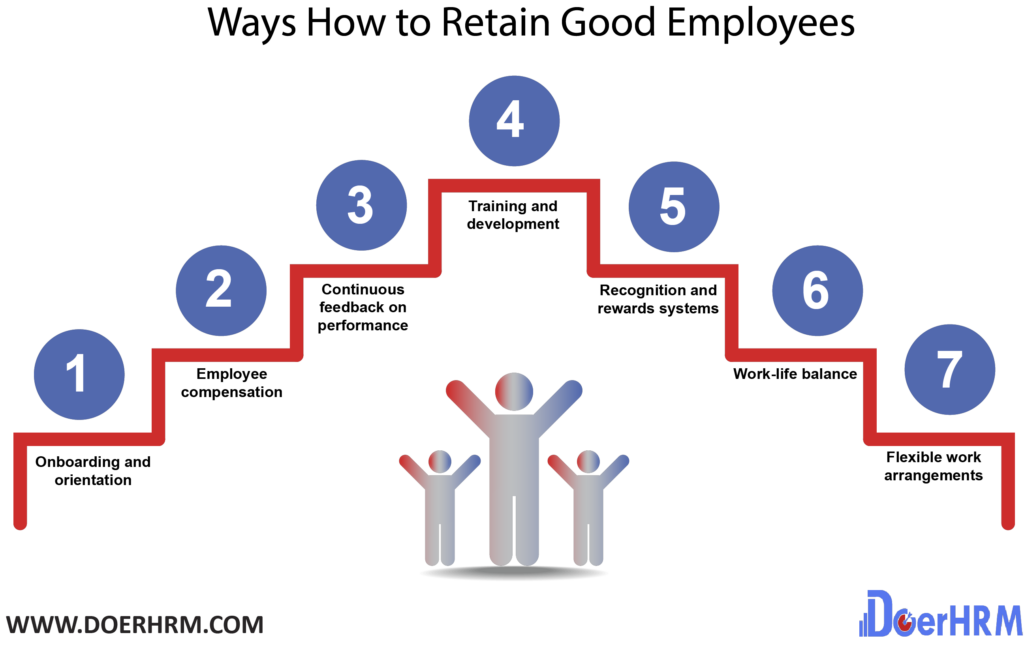Having an employee leaves your company can stir up a lot of emotions and leave questions unanswered. When you lose top talent, your company definitely suffers. You must fill that spot with someone hopefully just as talented. This can be a frustrating, time-consuming and costly process.
Having a great employee leave can also leave you scratching your head, wondering what happened and why they felt the need to jump ship? Providing an environment to promote employee retention does take a bit of work, and some digging into what your employees are thinking.
Let us explore 7 reasons why a good employee may leave so you can focus your energy on keeping your employees happy and helping your company thrive.
Reasons Why Good Employees Leave

1. Employee is not being engaged enough
If your employees are not feeling engaged and challenged by their work, they may become bored. They are putting in just enough effort to get the job done. This is a problem. If an employee is not engaged with their work, they may start looking for other employment opportunities that are engaging. You might have a star employee on board with all the talent you need, but if they are not being challenged and are bored at work, they are not showing up 100 per cent for your company.
2. Bad management
There is a saying that people quit bosses, not jobs. That is absolutely true. When an employee feels frustrated with management whether they are being micro-managed, there is no management or any variation in between. Your employees will not feel safe and secure expressing themselves, and you are setting your company up to have a high turnover rate. Poor management skills can be fixed and improve employee retention with great success.
3. No potential for growth or promotions
When an employee has no growth in their future job position that can dampen their motivation to stay with your company. People enjoy feeling like they are valued, and being given a chance to grow, improve and advance is a great way to let your employees know they are valuable to your company. Helping employees to further their skills and gain new skills will keep them engaged. Offering regular training and promotions will help retain employees and not have them looking elsewhere for advancement.
4. Not checking in regularly with employees
Checking in regularly with your employees gives you the chance to fix any issues that you might not be aware of. Checking in regularly with employees also makes your employees feel important and that what they are feeling is valid. There may be issues going on that you have no idea about, and if not taken care of, it can lead to good employees leaving your company. Shining a light on these issues and solving them can only be done sometimes by checking in and asking how your employees are doing. It does not have to be an intense process, and you could send out a survey at regular intervals, even offering the chance to be anonymized to express any issues that have arisen.
5. Offering no flexibility
Offering some flexibility in the workplace can lead to hiring great employees and keeping them. People are wanting to work from home more often now. Being able to offer remote work as an option is a great incentive to attract and keep good talent. Having a flexible work schedule, if possible, can even outrank a raise for making your employees happy.
6. No clear mission and goals
Having a solid and clear mission statement for your business is so essential for various reasons. One reason is that employees like to know what the goals are of the company and how they are contributing to the company’s overall well-being. Having a mission with specific goals and a strategy to achieve those goals is an excellent way to engage employees and feel like an asset.
7. No work-life balance
Employees have lives outside of your company. Overworking and not facilitating a good work/life balance is a sure-fire way to chase off talented employees. This is a point where getting feedback is essential; if an employee feels overworked and does not have enough downtime, there is a good chance you will lose that employee. Working with your employees to achieve a good work/life balance will help to ensure you have a happy and engaged staff.
Ways How to Retain Good Employees

1. Onboarding and orientation
Every new hire should be set up for success from the start. Your onboarding process should teach new employees not only about the job but also about the company culture and how they can contribute to and thrive in it. Don’t skimp on this critical first step. The training and support you provide from day one, whether in person or virtually, can set the tone for the employee’s entire tenure at your firm.
2. Employee compensation
It’s essential for companies to pay their employees competitive compensation, which means employers need to evaluate and adjust salaries regularly. Even if your business can’t increase pay right now, consider whether you could provide other forms of compensation, such as bonuses. Don’t forget about improving health care benefits and retirement plans, which can help raise employees’ job satisfaction, too.
3. Continuous feedback on performance
Many employers are abandoning the annual performance review in favor of more frequent meetings with team members. In these one-on-one meetings, talk with your employees about their short- and long-term professional goals and help them visualize their future with the company. While you should never make promises you can’t keep, talk through potential career advancement scenarios together and lay out a realistic plan for reaching those goals.
4. Training and development
As part of providing continuous feedback on performance, you can help employees identify areas for professional growth, such as the need to learn new skills. Upskilling your employees is especially important today as technology continues to change how we work. When people upskill, they gain new abilities and competencies as business requirements evolve.
Make it a priority to invest in your workers’ professional development. Give them time to attend virtual conferences, provide tuition reimbursement or pay for continuing education. Also, don’t forget about succession planning, which can be a highly effective method for advancing professional development and building leadership skills.
5. Recognition and rewards systems
Every person wants to feel appreciated for the work they do. And in today’s “anywhere workforce,” an employer’s gratitude can make an especially big impact. So be sure to thank your direct reports who go the extra mile and explain how their hard work helps the organization. Some companies set up formal rewards systems to incentivize great ideas and innovation, but you can institute compelling recognition programs even if you have a small team or limited budget.
6. Work-life balance
What message is your time management sending to employees? Do you expect staff to be available around the clock? A healthy work-life balance is essential to job satisfaction. People need to know their managers understand they have lives outside of work — and recognize that maintaining balance can be even more challenging when working from home. Encourage employees to set boundaries and take their vacation time. And if late nights are necessary to wrap up a project, consider giving them extra time off to compensate.
7. Flexible work arrangements
Many companies understand that even though they have reopened their offices, some of their employees still prefer to work remotely, at least part-time. Not having that option might even spur employees to resign. A recent Robert Half survey found that half of professionals working from home would look for a new job if they were required to return to the office full time.
So think sooner than later about what you can offer employees if remote work on a permanent basis isn’t an option. A compressed workweek? Flextime? Or maybe a partial telecommuting option? All of the above can help relieve stress for your team — and boost employee retention.






